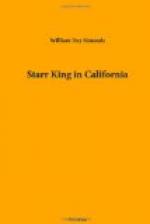In many communities and in varying phrase — always earnest and eloquent - King returned to the central theme of all his thinking and speaking, the greatness and glory of the Union, — “one and indivisible.” The following but illustrates the constant tenor of his teaching:
“If all that the past has done for us and the present reveals could stand apparent in one picture, and then if the promise of the future to the children of our millions under our common law, and with continental peace, could be caught in one vast spectral exhibition, the wealth in store, the power, the privilege, the freedom, the learning, the expansive and varied and mighty unity in fellowship, almost fulfilling the poet’s dream of
‘The Parliament of man, the federation of the world,’
you would exclaim with exultation, ‘I, too, am an American!’ You would feel that patriotism, next to your tie to the Divine Love, is the greatest privilege of your life; and you would devote yourselves, out of inspiration and joy, to the obligations of patriotism, that this land so spread, so adorned, so colonized, so blessed, should be kept forever, against all the assaults of traitors, one in polity, in spirit, and in aim!”
In a way we may say that King found himself in these first months in California. He was forced by the number of his engagements, as well as by the more direct demands of a new country, to throw aside his manuscripts, and, making such preparation as conditions would permit, launch boldly out upon the dangerous sea of extempore speech. He was constantly addressing audiences in whole, or in part, hostile. Writing to an Eastern friend of his experiences in the Sacramento Valley, he says, “You see in glaring capitals, ‘Texas Saloon,’ ’Mississippi Shoe Shop,’ ‘Alabama Emporium.’ Very rarely do you see any Northern state thus signalized.” Men of substance, natural leaders of the people, were in most communities either for Breckenridge or Douglas. The man was grappling with the intellectual soldiery of disunion. The same forces that had transformed Lincoln, the Illinois politician into a national figure, the standard bearer of a great party, were working upon King. And the same method which caused Horace Greeley to write of Lincoln, “He is the greatest Convincer of his day” was followed by the younger patriot, face to face as he was with incipient disloyalty. He was accustomed, even as Lincoln, to state his opponent’s argument fully and fairly, and then without unnecessary severity, demolish it. An old miner, listening to one of Starr King’s patriotic speeches, delighting in the intellectual dexterity displayed, exclaimed, “Boys, watch him, he is taking every trick.” The necessity of “taking every trick,” and this so far as possible without offence, quickened his powers and led to the full development of his many sided eloquence.
How he was regarded during these early months when he had literally plunged into the life of a community where nothing was as yet fixed, where everything was in the making, where the most serious questions of duty and destiny were stirring the hearts and consciences of men, — is made clear to us by the testimony of contemporaries whose sole desire must have been to render honor where honor was due.




